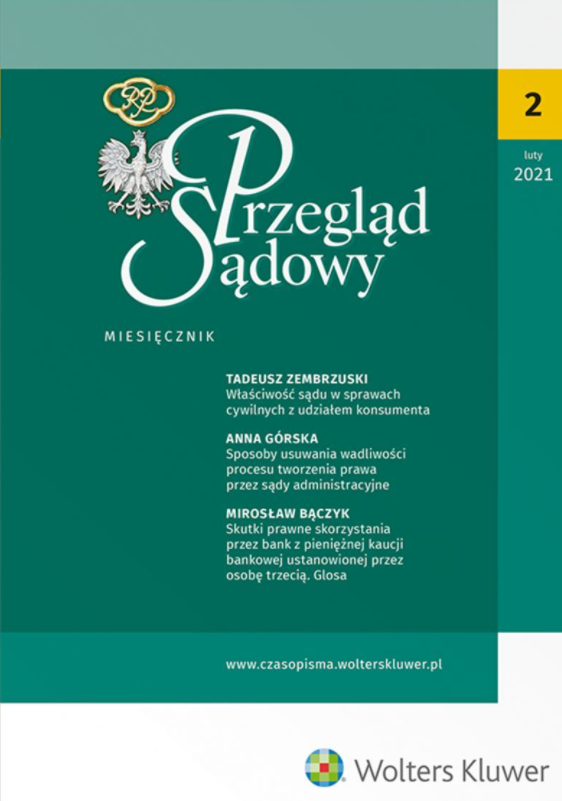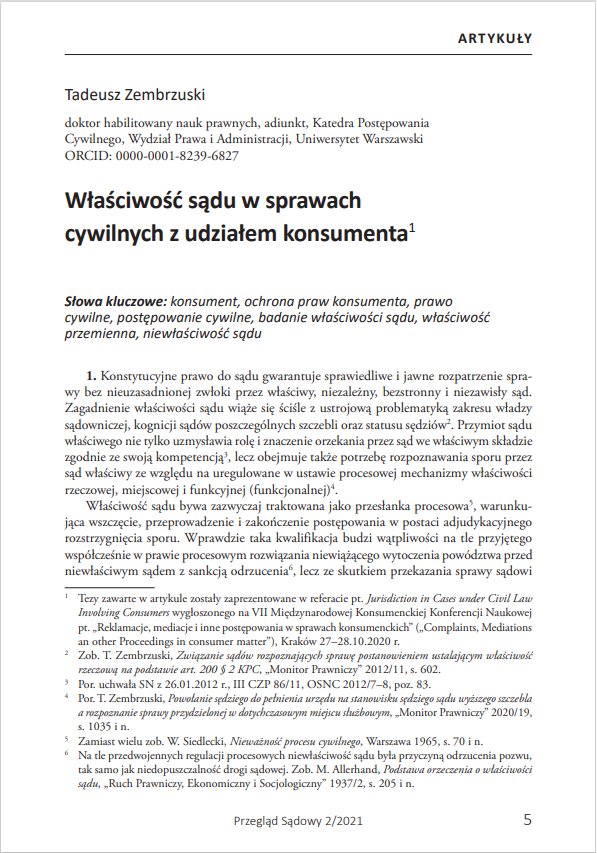
.
W najnowszym numerze Przeglądu Sądowego (2021, nr 2) ukazał się artykuł mojego autorstwa pt. Właściwość sądu w sprawach cywilnych z udziałem konsumenta (s. 5 – 19). Zachęcam do lektury.
.

.
Abstrakt:
Ochrona praw konsumenta jest domeną prawa cywilnego, lecz to w postępowaniu cywilnym jest realizowana ich ochrona. Procesowa autonomia stron wiąże się z ryzykiem, że przyznana swoboda zostanie jednak wykorzystana do działania na szkodę podmiotu słabszego lub osób trzecich. Ograniczona świadomość prawna i nieznajomość mechanizmów procesowych dotyczących zasad określania właściwości sądu powoduje, że strony niezastępowane przez zawodowego pełnomocnika zazwyczaj nie mają świadomości możliwości skorzystania z korzystnych rozwiązań procesowych, w tym podniesienia zarzutu niewłaściwości sądu. Do takich podmiotów można bez wątpienia zaliczyć konsumenta.
W ramach daleko idących zmian kodeksu postępowania cywilnego wprowadzonych w Polsce ustawą z 4 lipca 2019 r., określanych mianem tzw. reformy prawa procesowego, znalazły się m.in. zmiany odnoszące się do właściwości miejscowej sądu. W tym wypadku dostrzeżono potrzebę i konieczność wzmacniania pozycji procesowej konsumenta oraz jego ochrony przed niedoskonałościami wolnego rynku
Jedną z istotnych zmian było zastrzeżenie, że przepisów o właściwości przemiennej sądu nie stosuje się w sprawach przeciwko konsumentom. Konsument w dalszym ciągu może pozwać przedsiębiorcę korzystając z przepisów o właściwości przemiennej. Natomiast przepisów tych nie stosuje się w sprawach przeciwko konsumentom, co wzmacnia pozycję konsumentów w sporach z przedsiębiorcami. W sposób bezwzględny wyeliminowano sytuacje, w których słabsza strona stosunku prawnego była wciągnięta w spór przed innym sądem, niż sąd właściwy dla jej miejsca zamieszkania. Ograniczono ryzyko rezygnowania przez konsumentów z obrony swych praw ze względu na koszty dojazdu do sądu odległego od jego miejsca zamieszkania.
Istotne znaczenie dla pozycji procesowej konsumenta ma mechanizm sposobu badania przez sąd swojej właściwości. Dotychczasowy mechanizm nie sankcjonował działań polegających na świadomym kierowaniu pozwów do sądów niewłaściwych. Brak podniesienia zarzutu niewłaściwości sądu wiązał się z rozpoznawaniem sprawy przez sąd do tego obiektywnie niewłaściwy. Taki stan prawny wielokrotni spotykał się z krytyką. Nowelizacją kodeksu postępowania cywilnego z 4 lipca 2019 r. wprowadzono obowiązek kontrolowania przez sąd z urzędu właściwości niezależnie od etapu postępowania. Zdjęcie z pozwanego ciężaru obrony przed zastosowaniem prorogacji milczącej może być pozytywnie oceniane z perspektywy strony będącej konsumentem.
.
Jurisdiction of couts in civil cases involving a consumer. While the protection of consumer rights lies within the domain of civil law, it is in civil proceedings that such protection is actually exercised. The autonomy of parties in legal proceedings carries the risk that the freedom awarded will be used to the disadvantage of the weaker entity or third parties. Poor awareness of the law and a lack of familiarity with procedural mechanisms regarding the principles of specifying the court’s jurisdiction means that parties not represented by professional proxies usually remain unaware of the possibilities of taking advantage of beneficial procedural solutions, including raising the allegation of a lack of jurisdiction. Such entities most certainly include consumers.
The amendments to the Civil Procedures Code introduced by the Act of 4 July 2019, referred to as the reform of procedural law, included so-called reforms regarding the court’s jurisdiction. In this case, the need and requirement to strengthen the consumer’s procedural position and protect him against the imperfections of the free market was noticed.
One of the important changes was the reservation that the provisions on jurisdiction are not applied in cases against consumers. Consumers still have the right to bring an action against a business entity by taking advantage of the regulations on alternative jurisdiction. However, such provisions are not applied in cases brought against consumers, which strengthens the position of the consumers in disputes with business entities. Circumstances in which the weaker party is drawn into disputes before a court other than the court with jurisdiction over his place of residence have been unconditionally eliminated. The risk of consumers refraining from asserting their rights because of the high costs of travelling to courts located a considerable distance from their place of residence was thus limited.
The methods applied by a court when examining its jurisdiction are of particular importance to the consumer’s procedural position. The mechanism in force to date did not penalize activities involving an action being purposefully filed with courts of improper jurisdiction. If the court’s jurisdiction was not contested, the case was examined by an objectively incorrect court. Such a state of judicial affairs was repeatedly criticized. The amendment to the Civil Procedures Law of 4 July 2019 introduced the obligation for courts to monitor jurisdiction-related matters ex officio, regardless of the stage of the proceedings. Relieving the defendant of the burden of defence against tacit prorogation may be appreciated from the point of view of the consumer.
.